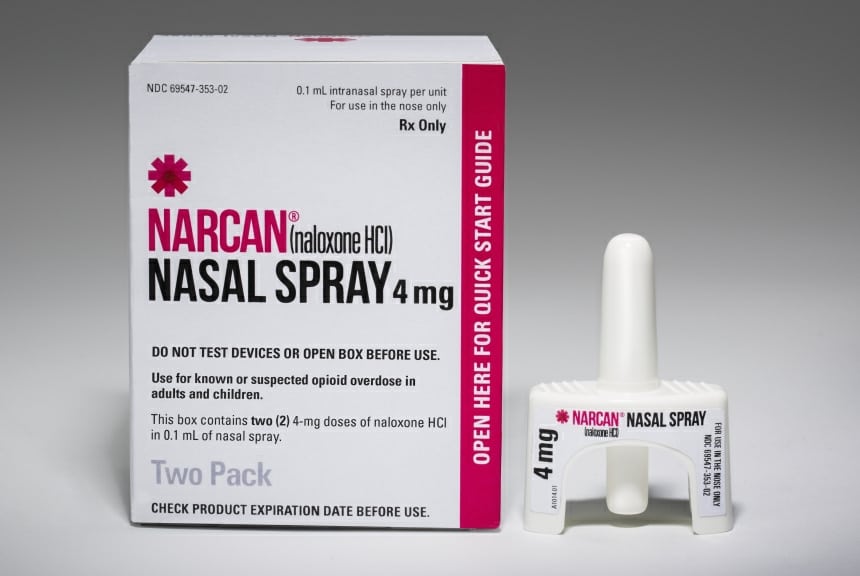

Use the search function below to search AllianceHealthPlan.org
This page provides an overview of the Naloxone formulary and a variety of information about accessing Naloxone.

NC DHHS Syringe and Naloxone Access webpage
Medicare Part D and commercial insurers vary in their coverages and copays. In general:
NC Medicaid Preferred Drug List (PDL) status
Preferred:
NOTE: Patient must try and fail two preferred products to get a non-preferred product; or have a unique clinical circumstance documented on the Standard Drug Request Form (for Medicaid Direct); for an individual’s specific NC Medicaid managed care organization standard drug request form, please visit that organization’s website.
Medicaid copay of $3 applies for a naloxone rescue kit. NOTE: the generic intranasal naloxone requires a “kit” costing ~$12 which is not covered by Medicaid.
Note regarding Medicaid copays: An eligible Medicaid beneficiary, who receives prescribed drugs, is required to make a co-payment of $3.00 for each prescription received unless they are exempt (NC Medicaid Outpatient Pharmacy Policy 9, Section 5.5.1). A provider may not deny services to any Medicaid beneficiary because of the individual’s inability to pay a deductible, coinsurance, or co-payment amount. A provider may not willfully discount copays for a Medicaid beneficiary, and an individual’s inability to pay does not eliminate his or her liability for the cost-sharing charge.
Note: pregnant women on Medicaid should not pay copays on medication. The co-payment exemption is made automatically by the claims processing system for an eligible beneficiary. In the event that the system does not override the copay, the pharmacy may use any of the ICD-10-CM codes listed in Attachment J (see page 75) to indicate pregnancy. A “4” in the Prior Authorization Type Code or a “2” in the pregnancy indicator field on a point-of-sale (POS) claim also indicates an exemption from the co-payment deduction for pregnancy.
Visit NaloxoneSaves.org to learn more about where you can get Naloxone.
As of October 2021, 37 health departments statewide indicated on the Naloxone Saves website that they offer naloxone, and these include the following Alliance catchment area counties:
Since the Overdose Prevention Project (OPP) became operational August 1, 2013, NCHRC has dispensed over 80,000 free community overdose kits that include naloxone (as of 8/2/2018) and have received 11,583 confirmed reports that the life-saving medication was administered successfully by lay individuals. Currently, the OPP has over 130 volunteer contractors who dispense the overdose rescue kits throughout the state.
NCHRC would like to distribute free overdose rescue kits to individuals who can be described as:
To reach NCHRC regarding a person at risk of experiencing or witnessing a drug overdose, visit the NCHRC website, call/text -910-685-5596, or email Jesse Bennett at [email protected].
Syringe Exchange Sites
Naloxone is also available at the various syringe exchange sites around the state. Find your local syringe exchange site.
Naloxone is free from local MOUD programs
Programs receive nasal Narcan. NC Harm Reduction distributes IM naloxone at the following Wake/Durham/Johnston/Cumberland sites (list of statewide sites).
NOTE: A naloxone rescue kit contains two naloxone doses.
Injectable Naloxone
Generic IM Naloxone – least expensive version.
Intranasal Naloxone
BRANDED
Nasal Narcan 4mg (two nasal devices per kit).
Kloxxado 8mg (two nasal devices per kit). Just released; information will be updated shortly.
GENERIC
Intranasal Naloxone “Project Lazarus Kits”.
NC DHHS “Naloxone Saves” website. Statewide standing order, patient education resources, referrals, notify the state.
Prescribe to Prevent. Best overall site. Includes patient education including videos.
Morphine Milligram Equivalents (MME) Calculator.
College of Psychiatric and Neurologic Pharmacists
Key points about the naloxone standing order:
Key points to consider
Initiate the conversation
Conversation starters to use instead of “overdose”:
Safe storage and disposal of unused opioid doses is crucial. Most illicit opioid users started out by borrowing or stealing Rx opioids from friends/family (legal and legitimate users). Four out of five heroin users started out with Rx opioids. Society needs fewer opioids out there. Find the closest drug disposal location near you.
Third-party prescribing: Third party prescribing/dispensing permits the prescription and dispensing of naloxone to a person other than the person at risk of overdose. The 2013 Naloxone Access Law passed in North Carolina under G.S. 90-12.7 (formerly codified as G.S. 90-106.2), a health care provider may write a standing order to allow the dispensing of naloxone to people at risk for an overdose and to those in a position to help others at risk of an overdose, known as third-party prescribing. The statute provides criminal and civil liability protection to health care providers who prescribe naloxone and to those who administer naloxone to persons experiencing an overdose.
It is legal and ethical for pharmacies to sell insulin syringes, no questions asked. Prevent transmission of Hep C and HIV. Syringe sales to IVDU does NOT encourage the habit. Reference http://www.ncbop.org/faqs/FAQsNonPrescriptionSyringeSalesNC.pdf.
Mental health or substance use crisis referral: Crisis Solutions North Carolina.